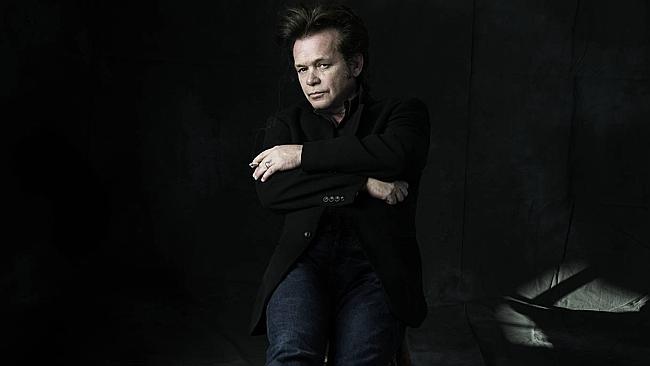American kid all grown up in the heartland

John Mellencamp is getting less rocking and more rootsy with age.
Source: Supplied
THIS week’s album reviews from The Courier-Mail (ratings out of five stars).
ROOTS
JOHN MELLENCAMP
Plain Spoken (Republic/Universal)
****
IF BRUCE Springsteen is the poet of working-class America, John Mellencamp is the voice of the nation’s heartland.
He might be firmly rooted in Bloomington, Indiana, but he bucks the Midwestern stereotype with his liberal worldview and portrayal of religion as a source of salvation rather than division.
In recent years, not only have his albums grown quieter and more introspective but themes of human frailty and the promise of redemption have become more pronounced.
There are two types of John Mellencamp record: the fully plugged-in, fully produced R.O.C.K. in the U.S.A. type, and the quieter, more introspective flesh-on-wood type. Plain Spoken definitely fits the latter category, continuing Mellencamp’s trend toward more restrained efforts. This makes it less accessible than, say, 2007’s Freedom’s Road and more like its successor Life, Death, Love and Freedom.
Yes, it’s a slow grower, but if you invest the time the melodies and textured instrumentation reveal themselves. As its title suggests, Plain Spoken is straightforward in both its music and its message. The stripped-down approach allows instruments such as violin, accordion, piano, mandolin, tambourine and harmonica to take centre stage, giving the album a rootsier feel than Mellencamp’s past rock fare.
And his smoky drawl is undimmed by the passage of years. If anything, now in his 60s, he’s sounding more world-weary than ever.
His albums of recent years have not only dealt with how he feels America has lost its way, but also struggles for redemption on a personal level. And things have been tumultuous in his own personal life, with his 18-year marriage ending, a short-lived romance with actor Meg Ryan, and now a lifelong commitment to Republic Records.
Troubled Man sets the scene with Mellencamp’s brooding over a life of unfulfilled promise and a tune in which The Eagles meet Grant Lee Buffalo: “So many things have fallen through my hands/I am a troubled man.”
The Isolation of Mister, meanwhile, recalls Pearl Jam’s Off He Goes: “Been so indifferent about so many things … Thought I was living a life of freedom/But I was living in a cage.”
Mellencamp may be outspoken in his leftist views but he still respects the opinions of others, as demonstrated on the violin-driven ditty Freedom of Speech: “If your thoughts are different/Well, I think that’s OK.”
The mournful yet upbeat Tears in Vain is a standout, with Mellencamp’s lament punctuated by bursts of harmonica and haunting Shadows-esque guitar.
Mellencamp wears his spirituality on his sleeve but manages not to come off preachy, with believers and nonbelievers alike able to take something away: “We all need God when people don’t care/What we do to each other when there’s no one else there,” he sings on Sometimes There’s God.
He may be rocking out less but Mellencamp can still pack a punch with his music, and he’s keeping the faith with the string-band sensibility of America’s heartland.
John O’Brien
ROCK
LOWTIDE
Lowtide (Lost and Lonesome)
****
SOME music is as welcome as a calming swim after a week of frenetic activity and dusty labour. The music of this Melbourne quartet asks you to slow down the heart rate and dive in deep. Opener Whale keeps the water imagery flowing, from the opening invitation to “take the boat out to the reef’’ as cascading waves of guitar ripple through amid the almost-whispered vocals of Lucy Buckeridge and Giles Simon. This is music all about texture, with vocals held so far back that it’s not easy to discern what anyone is actually singing. But Lowtide manage those textures with skill, from 55-second ambient interlude Autumn to the dream-state pastures of Blue Movie and Yesterday (I would have advised a different title, even if no one would mistake it for a McCartney tune). Wedding Ring provides up-tempo pop thrills while Missing History and Maxillae Leaving Seaward are vocal and instrumental interpretations of a similar musical theme. Fans of ’90s bands such as Ride and Glide will enjoy. If you are allergic to swathes of reverb, steer clear.
Noel Mengel
ROCK
THE DELINES
Colfax (Warner)
****1/2
“DARKNESS ain’t such a hard road if we don’t go down it alone,’’ Amy Boone sings on the exquisite opening track to this debut album by The Delines. The pain is eased if you’ve got songs this good to help light the way. It’s a new band but packed with experience, with Willy Vlautin of country-rock band Richmond Fontaine writing the songs, with Amy Boone’s late-night croon wrapping around them like smoke from the last cigarette. There is restraint throughout, with baritone guitar, pedal steel and electric piano providing the colours to music that tips its hat to the country/soul sounds coming out of Memphis in the late ‘60s. These characters are broken, bruised or just hanging on, planning their escape from the tough side of the tracks. Vlautin’s parallel career as a novelist takes inspiration from Raymond Carver, and songs like He Told Her the City Was Killing Him play out like a short story. Boone’s
delivery is perfect for these songs, some of Vlautin’s finest, plus Randy Newman’s Sandman’s Coming. If you didn’t already think it was the saddest lullaby ever written, you will after you hear Boone sing it.
Noel Mengel
STANDARDS
BARBRA STREISAND
Partners (Sony)
**1/2
IF YOU are a serious Streisand fan you will own her earlier versions of many of these tunes. You might even enjoy the curious mishmash of Streisand’s show-tune rendition of Love Me Tender in duet with Elvis Presley, even if it could produce apoplexy in Presley fans. Elsewhere the duets format — so commercially successful for Tony Bennett and Frank Sinatra — is handled tastefully, with Michael Buble and Lionel Richie getting the plum roles on It Had To Be You and The Way We Were respectively. Stevie Wonder’s voice sounds not aged at all (neither does Streisand’s) on People; John Mayer is allowed to play some bluesy guitar licks on Harold and Johnny Mercer’s Come Rain or Shine; Billy Joel does the honours on New York State Of Mind, originally covered by Streisand in 1977. The album comes with five bonus tracks (four previously unreleased) including a version of I’ve Got a Crush On You with Frank Sinatra. Aficionados will prefer last year’s Back to Brooklyn live set. Christmas shoppers will probably opt for this.
Noel Mengel
ROCK
J MASCIS
Tied to a Star (Sub Pop)
****
J MASCIS hasn’t put a foot wrong since reconvening the original line-up of Dinosaur Jr for 2007’s Beyond LP and his late-career purple patch continues with this follow-up to 2001 solo outing Several Shades of Why. The album opens with the sublime Me Again, which juxtaposes Mascis’s inimitable slacker drawl with some of the most achingly beautiful, subdued, finger-picked guitar he has ever committed to record. Throughout Tied to a Star, Mascis’s vocals alternate between falsetto and his go-to fragile, slightly off-kilter bellow. Although it is ostensibly an acoustic album, Mascis can’t help but plug in the Fender and shred out a solo on songs such as lead single Every Morning — the most Dinosaur Jr-esque song on the album — and at the conclusion of the otherwise-mellow Trailing Off. Elsewhere, Wide Awake is another exercise in restraint, and instrumental Drifter blends Eastern influences with alt-country, while Come Down and Better Plane both give Mascis further opportunity to showcase his vulnerability. All in all, a welcome addition to Mascis’s ever-expanding discography.
Daniel Johnson
POP
MISSY HIGGINS
Oz (Eleven)
***
HERE Higgins digs deeper than most singers ever go into the Australian songbook. One of two big hits she gets her teeth into is The Angels’ No Secrets, given a piano-and-strings treatment that feels like it was always meant to be that way. Not a crunching guitar chord in sight. Less successful is Paul Kelly’s Before Too Long, stripped of its country-rock form with string quartet arrangement and co-vocal from Amanda Palmer. Other familiar songs that get the treatment include Warumpi Band’s Blackfella/Whitefella and The Go-Betweens’ Was There Anything I Could Do, but it’s the lesser-known material that sparkles: a gentle take on Something For Kate’s You Only Hide, Dan Sultan’s tale of hard times Old Fitzroy and The Drones’ Shark Fin Blues, which reveals the quality of Gareth Liddiard’s lyrics behind those corrosive guitars. Sultan joins in for a folkie singalong on Slim Dusty and Joy McKean’s The Biggest Disappointment but the standout is Perry Keyes’ NYE, turning his folk-rock marvel into a more upbeat celebration. If only it could be a hit, Perry might be able to at least put his feet up on NYE.
Noel Mengel
CLASSICAL
VARIOUS ARTISTS
Agony & Ecstasy: Australian Music From the Time of Arthur Boyd (ABC Classics)
****
THIS collection features Australian music created across the eight decades of Australian artist Arthur Boyd’s life. Designed to link with a Boyd art exhibition of the same name at Canberra`s National Gallery of Australia until November 9, the CD traces parallel Boyd milestones by chronology and shared imagery. First comes Percy Grainger’s Spoon River from 1919, a year before Boyd`s birth, its essential jauntiness well measured by Melbourne Symphony Orchestra, John Hopkins conducting. John Antill’s 1946 composition Corroboree — Rain Dance, performed in this 1950 recording by Sydney Symphony Orchestra, Eugene Goossens conducting, approximates Boyd’s 1951 central Australian visit when indigenous living conditions shocked him. Composers Peggy Glanville-Hicks, Miriam Hyde, Alfred Hill, Peter Sculthorpe, Malcolm Williamson, David Lumsdaine, Ross Edwards, Carl Vine and Richard Meale, whose exquisite contemplation Lumen came in 1998, a few months before Boyd’s death, are also represented in this rich cultural anthology.
Patricia Kelly









